While some students consider the vaccine a necessity for in-person learning, others say their vaccination status is none of Ryerson’s business
Words by Rochelle Raveendran
Visuals by Jes Mason
Rustling papers, frantic pen scratching and anxious breathing formed the rhythm of a typical Ryerson midterm exam as Sofia Rodríguez-Garzon sat in a classroom in the George Vari Engineering building. It was March 2020, and their only malaise derived from a little test anxiety. The course was one of their favourites, a deep-dive into countercultural communications, but the professor was known to be a hard marker and they knew the midterm would not be easy.
Rodríguez-Garzon, now a fourth-year professional communications student, finished up what would be their last in-person exam on campus and rode the 501 streetcar down Queen Street back to their Parkdale home, where they lived alone. They say they love the TTC; using public transit frequently was an exciting prospect for them when they moved to Toronto from Colombia as an international student in 2017. When they arrived home, Rodríguez-Garzon noticed they had a runny nose—something that barely fazed them considering the chilly spring weather.
Over the next few days, however, their sniffles escalated into a painful nasal congestion. It was probably a sinus infection, they thought, but they definitely didn’t feel well enough to attend their lectures. They pulled out their laptop to email their photojournalism professor, excusing themself from class. Six days later, the Ford government announced a state of emergency in Ontario. By then, Rodríguez-Garzon had already lost their sense of taste and smell.
“I was terrified because I was like, ‘I don’t know what’s happening. I fully have no idea,’” they recollect. “I didn’t know who to call.”
Rodríguez-Garzon describes the following weeks as a “fever dream.” Alternating between their bed and their oatmeal-beige speckled sofa, the same questions ran through their mind: Is this COVID-19? What are the symptoms of COVID-19? How do I know if it’s just a cold? In the midst of anxiety-driven Google searches, they found a self-assessment tool on the Government of Ontario’s website that confirmed their worst suspicions: they had contracted COVID-19.
Reluctant to frighten their family living a continent away in Colombia, Rodríguez-Garzon kept their illness to themself, only telling one of their best friends. The following days were taxing and scary—they were so fatigued that walking around their apartment left them out of breath. At night, they’d wake up in a panic buried in the same cream-coloured sheets they use now, immediately rushing to check their breathing and temperature. An iteration of the same stressful routine continued for three weeks as they self-isolated. Today, over a year later, Rodríguez-Garzon lives with two roommates, one of whom is at high-risk for severe illness from COVID-19. Even though all three are fully vaccinated and carefully adhere to safety protocols, including double-masking and sticking to a vaccinated social bubble, a heightened sense of caution continues. Rodríguez-Garzon says, while they’re grateful to now be living with others, it can feel isolating to see people freely socializing with friends while they and their roommates remain cautious. “It’s summertime, so of course I want to be out. Of course I want to go on a road trip or have a picnic,” they say. But whenever they start to make such plans, several vital questions persist in their mind about who they can meet, where they can meet them and whether the location will be ventilated.

This July, when Ryerson announced plans for a partial campus reopening in the fall 2021 term, Rodríguez-Garzon decided they wouldn’t return in-person, as they didn’t have any in-person classes and were unwilling to compromise their roommates’ and their own well-being. “I can’t check everyone’s vaccination status and of course I don’t know how people are behaving,” they say. “It’s out of my hands.”
As Ontario post-secondary schools like Ryerson University reopen their doors this fall, vaccine hesitancy poses an ample obstacle to overcome in pursuit of normalcy for the new academic year. While some Ryerson students believe all individuals on campus must be vaccinated against COVID-19 to create a safe environment for students and staff alike, others remain indecisive on the vaccine and question the university’s authority to enforce an immunization mandate.
Ryerson’s COVID-19 vaccination policy, unveiled just two weeks before the start of the semester, requires all individuals coming to campus to be fully vaccinated or participate in rapid antigen testing. Under Ryerson’s COVID-19 vaccination policy, proof of vaccination or an exemption application must be submitted by Sept. 20 on the RyersonSafe app or desktop site. However, details about the uploading process are still forthcoming. Exemptions will be allowed for medical reasons or grounds covered by the Ontario Human Rights Code, including religious beliefs.
Several post-secondary schools in Ontario have enacted similar campus COVID-19 vaccine requirements. Lower rates of young adults being vaccinated compared to the rest of the population strengthens the case for a mandate; only 62.6 per cent of people aged 18 to 29 in the province are fully vaccinated. As cases continue to climb, with the majority occuring amongst unvaccinated or partially vaccinated people, Ontario’s Chief Medical Officer of Health, Dr. Kieran Moore, says it’s anticipated young people will be hospitalized at higher rates in the fourth wave.
Dr. Barry Pakes, director of the public health and preventive medicine residency program at the University of Toronto, says post-secondary schools could play a critically important role in promoting younger demographics to get vaccinated by creating a COVID-19 immunization requirement. He says a “vaccine or virtual” option gives unvaccinated students an incentive to get vaccinated so they can return to in-person activities.
“It’s always difficult to mandate things,” Pakes says. “But when you’re talking about something so safe and effective and really innocuous as the COVID vaccine, it’s hard to justify not making it as close to mandatory as possible.”
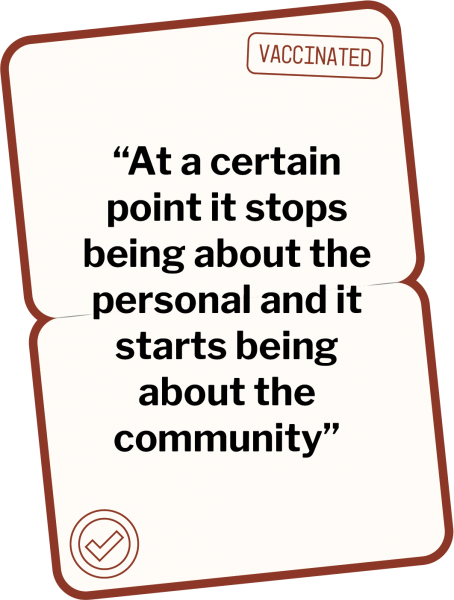
Individuals who are vaccinated against COVID-19 are 50 times less likely to be admitted to an ICU than someone who isn’t vaccinated, according to a CBC report from August. Despite this significant degree of protection, vaccine hesitancy is not uncommon; an April 2021 study, conducted by the Journal of Medical Internet Research, found lack of knowledge about the vaccine and concerns about its safety both contribute to uncertainty toward getting the jab.
Student dissent over COVID-19 vaccine mandates on Ontario campuses has already spurred legal action. Two students are preparing to sue Seneca College over its immunization requirement. But Jacob Shelley, an associate professor at Western University’s Faculty of Law and School of Health Studies and the director of the Health Ethics, Law and Policy Lab, says it’s unclear whether legal challenges made under the Charter of Rights and Freedoms will be successful.
“The reality is there’s many risky activities on campuses and there’s many activities that are limited or curtailed,” Shelley says. “I think of smoking bans on campuses; they’re there to protect people from the deleterious effects of secondhand smoke.”
A responsibility to protect others is exactly why Rodríguez-Garzon believes getting the COVID-19 vaccine cannot solely be framed as a personal choice. They say it’s better described as a personal choice with deeply public and social consequences. If one person were to get sick, they explain, it could spread throughout the Ryerson community, affecting students, staff and high-risk people in their respective social circles.
“At a certain point it stops being about the personal and it starts being about the community…and the safety of multiple people beyond the comfort of a single individual,” says Rodríguez-Garzon.

very week, Jesse S.* gets in his blue Chevrolet Silverado and takes a ten-minute drive from his home in Toronto to visit his 87-year-old grandmother. She lives alone in the same house she’s owned since the 1970s—well over the entirety of Jesse’s life. It’s a regular feature in his childhood photos, her yellow walls decorated with paintings and artifacts from countries she’s visited around the world. During his visits, typically lasting a few hours, they cook food together and catch up on their week sitting on her porch or inside her home. In these moments of togetherness, it’s not so much what Jesse and his grandmother do that matters to him; it’s the time he spends with her that he cherishes the most.
When the COVID-19 pandemic hit in full swing in March 2020, Jesse, now in his fourth-year studying marketing management, stopped visiting his grandmother as he and his family sought more information on the virus and its impacts.
This uncertainty, coupled with his grandmother’s age, which places her at high risk, made Jesse wary of in-person visits. Instead, he’d call his grandmother two or three times a week and she would answer on her old-fashioned landline. However, these calls soon proved insufficient—his grandmother began to feel isolated, lonely and in distress from the sudden loss of contact with Jesse.
Although a COVID-19 vaccine was only a distant possibility at the time and despite the significant potential risk to her health, she was persistent that she continue to see her grandson. As her requests continued, Jesse researched data on the Public Health Ontario website, finding that mortality from COVID-19 was lower for younger individuals and people without underlying medical conditions.
Jesse was then reassured to resume his visits to his grandmother in April, which became a weekly priority for him while Ontario was under lockdown and COVID-19 cases continued to climb in the first wave. “Especially [as] an 87-year-old woman being by yourself all the time, things do tend to get lonely,” he says. “Not being able to see family would be much worse than the actual threat the virus poses to her.”
Today, Jesse’s grandmother is fully vaccinated against COVID-19, but Jesse is not; the visits continue, however.
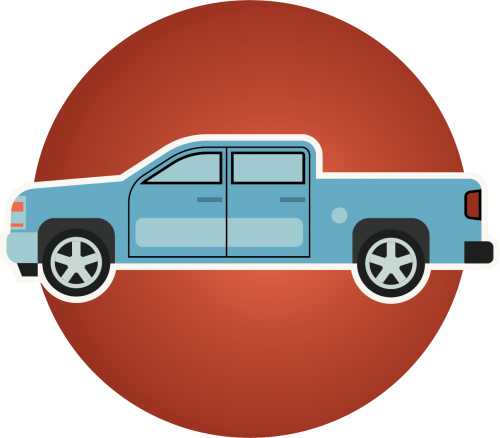
Jesse stresses his vaccine hesitancy in no way makes him an anti-vaxxer. He says he’s received all his mandatory immunizations and has gotten the flu shot almost every year since he was a child. He also encouraged his grandmother to get the COVID-19 vaccine. Jesse’s initial concern was that no vaccine had received full approval from the Food and Drug Administration. Although the Pfizer vaccine was approved in late August, he intends to wait a little longer to observe data from long-term trials on the vaccines before getting the shot. Currently, the Pfizer, Moderna, AstraZeneca and Johnson & Johnson COVID-19 vaccines are all approved by Health Canada.
In Toronto, six vaccines are mandatory for school-aged children, covering diseases such as polio, measles and hepatitis B. Brenda McPhail, director of the Privacy, Technology and Surveillance program at the Canadian Civil Liberties Association, explains the legal authority for this mandate originates from Ontario provincial legislation passed in 1982, defining the diseases elementary and high school students must be vaccinated for and setting out exemptions under human rights laws. McPhail says no such legal authority currently exists “to ensure appropriate, consistent and rigorous safeguards” for post-secondary schools to follow when imposing a COVID-19 vaccine mandate.
Jesse thinks Ontario’s immunization requirements for school-aged children are unquestionably justified, but he says the severity of the illnesses covered by the provincial mandate is incomparable to the severity of COVID-19 for the “average” Ryerson student. “Take me, for example. I’m a very healthy individual. I exercise quite frequently. If I got polio, it’s almost guaranteed that I would die, but if I got COVID, there’s [a greater] chance that I’m going to survive.”
Due to his health and age, at 20 years old, Jesse says he has little concern about getting COVID-19, despite the elevated risk to unvaccinated individuals and an increase in younger unvaccinated Canadians being hospitalized with severe complications from the virus. When Jesse has been sick in the past, it’s typically over in three days, he recalls. He also personally knows people his age of similar health whose COVID-19 symptoms didn’t exceed that of a typical flu.
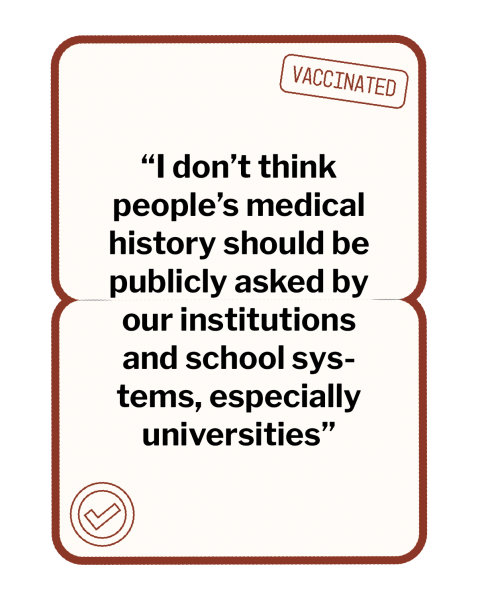
Jesse believes a campus vaccine mandate would be inappropriate and sets a strange precedent. “I don’t think people’s medical history should be publicly asked by our institutions and school systems, especially universities,” he says. “If Ryerson started asking people ‘Can you provide a clean STD test?’ or you can’t enter campus, I think [that would be] a little bit strange.”
McPhail says when collecting proof of vaccination, the privacy interest must be balanced with the necessity and proportionality of the public health goal in question. The process of this balancing should be transparent. She explains the way information is shared, including how vaccination proof is collected and stored, who has access to it and how long it is stored for, should have appropriate limits and safeguards.
Dr. Pakes says both public health motivations in promoting vaccines and legal concerns about individual liberties are understandable. “It’s just a matter of where we are as a society and where we want to be and what small degree of privacy we’re willing to give up for a return to somewhere closer to normalcy,” he says.
Jesse’s third year at Ryerson dwindled away within the four walls of his bedroom. It was daunting for him, sitting at his desk every day completing a full course load with unchanging scenery and limited interaction with others. “It’s quite depressing in a sense because you’re just sitting at home all the time,” he says. To combat this isolation, Jesse frequently visited his friends in backyards throughout the year, with the encouragement of his parents. “They were like: ‘Okay, you’re a 20-year-old kid. You can’t just stop living your life because of a virus,’” he recalls.
Jesse knows that statement is controversial, but he says for many young adults in the prime of their lives, 2020 was a lost year. His fall semester will also be entirely virtual, but he hasn’t decided whether he will submit an application for an exemption to Ryerson’s vaccine mandate, though he would enjoy meeting old friends on campus and using the Sheldon and Tracy Levy Student Learning Centre again. Jesse suggests Ryerson should have sought greater input on their COVID-19 policies, perhaps through a poll; he says there are many people like him who are not anti-vaxx but are waiting for more data on the COVID-19 vaccine before getting immunized. “I don’t try to push [that] you shouldn’t get the vaccine. I also don’t push [that] you should get the vaccine because I think it’s people’s personal choice,” he says. “Whatever they feel necessary to do to protect themselves, I support wholeheartedly.”

t’s been over a year since Rodríguez-Garzon last saw their family. Despite regular FaceTime calls with their loved ones, their wistfulness for home hasn’t subdued. They reminisce about visiting their parents in Bogotá and Firavitoba, hugging them and petting their cat. Memories of homemade food are wrapped up in nostalgia and longing, particularly one grandmother’s ajiaco, a traditional soup and the other’s empanadas and tamales. Despite missing home, ever-changing COVID-19 travel policies and concerns about potentially exposing their family to the virus have kept them in Toronto. “It’s been difficult but I would like to think that I also stayed for something,” they say.
Rodríguez-Garzon feels baffled by COVID-19 vaccine refusal amongst those without a medical exemption, especially considering half their family members in Colombia, including their grandparents, don’t have access to a vaccine yet.
“Canada has allowed people to get vaccines easily, readily and for free,” they say. “It’s ridiculous people here are just being stubborn and declining, when it’s actually a huge privilege to take getting vaccinated against COVID as a given.
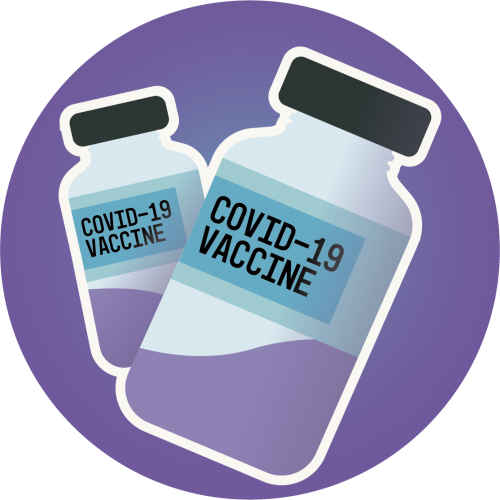
In the wake of Ryerson’s vaccine mandate, Rodríguez-Garzon feels more confident in returning to the campus for which they moved countries to attend, with plans to go to an in-person lecture this semester, added to their schedule just last month. They see being vaccinated against COVID-19 as a necessary precaution to participate safely in student life. “If you want to drive, you need a driver’s license. If you want to go to campus during a global pandemic, you should be vaccinated against it so that you can prevent people from getting sick,” they say.
As Rodríguez-Garzon feels reassured to return to campus, this may also spell a modified return to the experiences that once formed their pre-pandemic life at Ryerson. They miss their close friendships with students in their program, stealing each other’s food and chatting about music and life in their program lounge. They want to use in-person student support services like the International Student Centre and rent out valuable recording equipment for their coursework, both of which they couldn’t access this past academic year despite paying an inflated international tuition fee.
Even just riding the streetcar or subway to Ryerson and around the city is an experience Rodríguez-Garzon misses and truly loves. “There’s a certain charm to the city that we don’t get to experience because of COVID,” they say. “Being able to go to campus [will] allow us to have a semblance of that again.”
For Rodríguez-Garzon, vaccines are the simple key needed in order to put that semblance within their grasp.
*Last name has been changed to protect source’s privacy and security

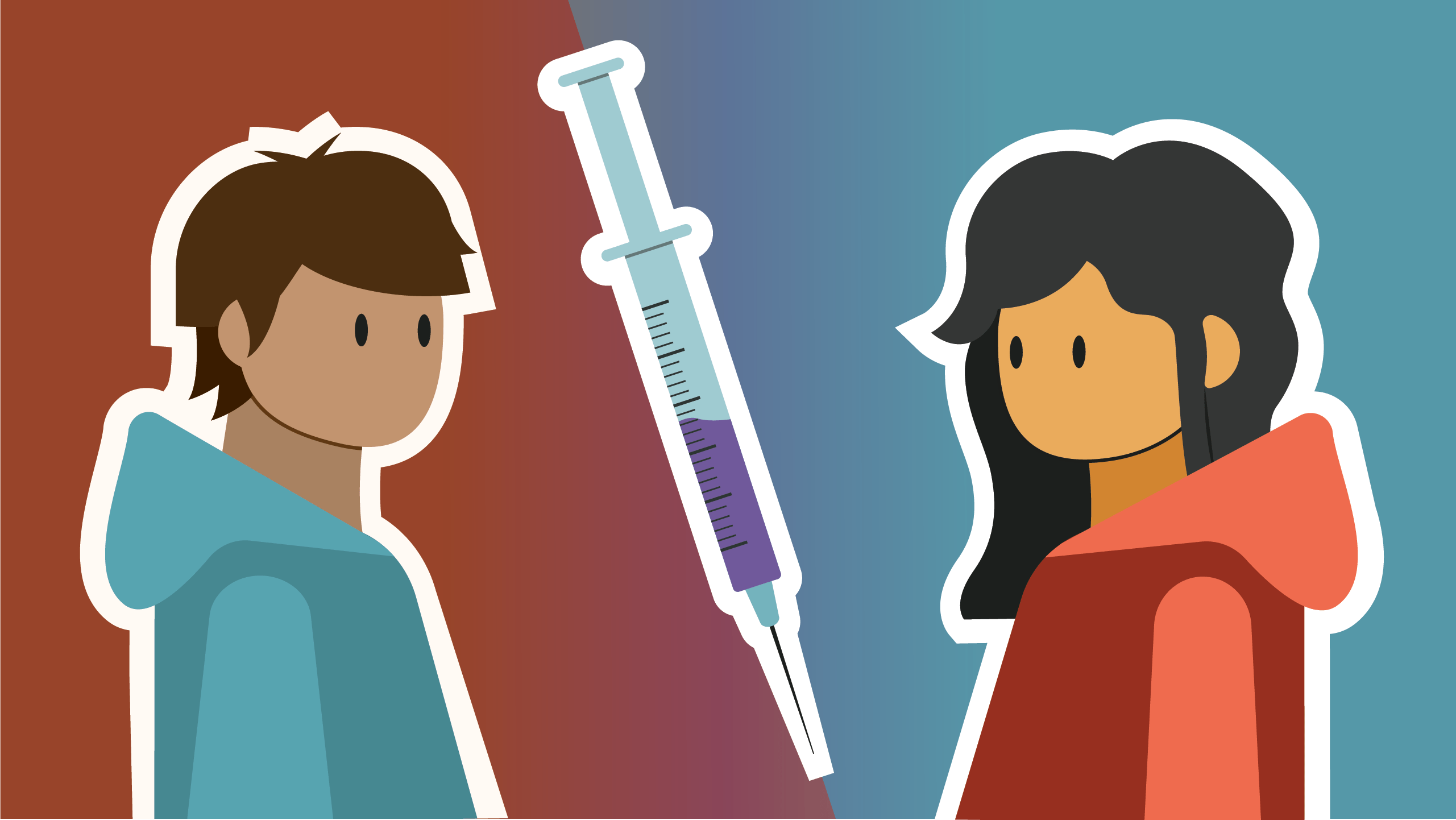








Leave a Reply